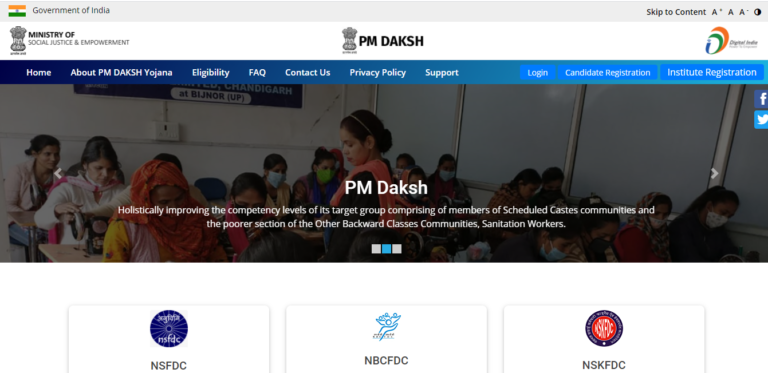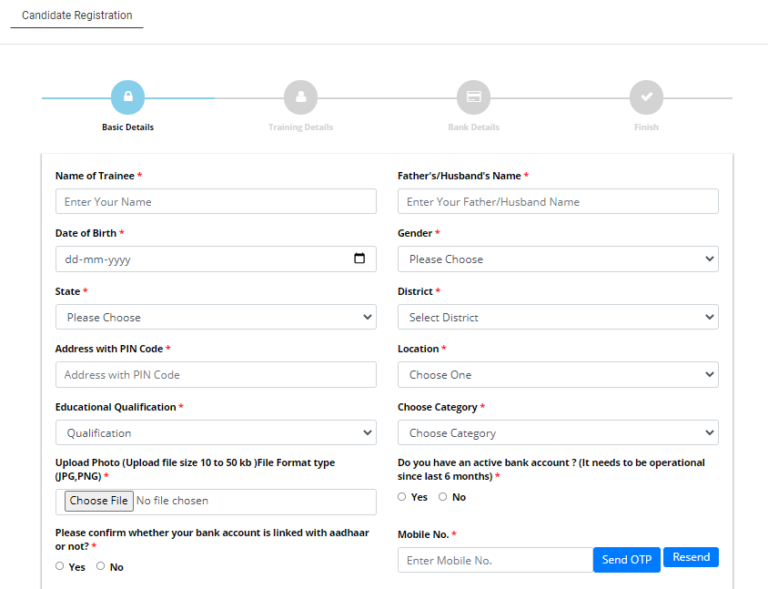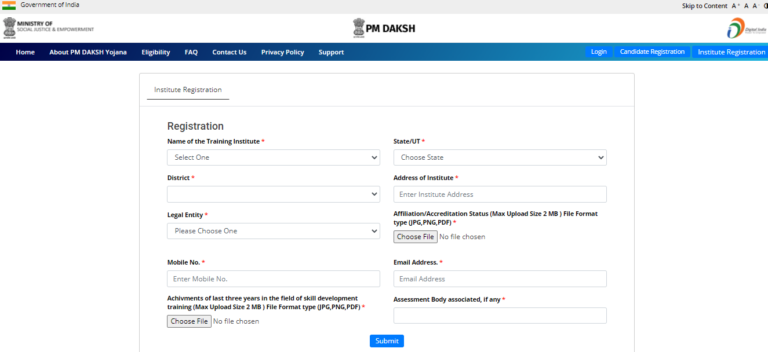PM Daksh Yojana 2021 | pmdaksh.dosje.gov.in | Online Registration – PM-DAKSH (Pradhan Mantri Dakshta Aur Kushalta Sampann Hitgrahi) Yojana is a National Action Plan for skilling of marginalized persons covering SCs, OBCs, EBCs, DNTs, Sanitation workers including waste pickers. Continuous efforts are made by the Government to promote employment opportunities across the country. Various types of training are also provided by the Government to generate employment opportunities In India. For which various types of schemes are operated by the Government. Today, we are going to provide you with information related to one such scheme called PM Daksha Yojana.
Through this scheme, training will be imparted by the Government in various fields. By reading this article, you will be able to know the process of applying under this scheme. In addition, you will also be able to get information related to login, purpose, benefits, features, eligibility, important documents etc. So if you want to get the benefit of PM Daksh Yojana, you are requested to read this article by the end of our article.
Table of Contents
Key Highlights of The PM Daksh yojana
| Yojana Name |
|
| Ministry |
|
| Beneficiary |
|
| Objectives |
|
| Official Website | |
| How To Apply | Online |
| Starting Date Of Online Form | 5 August 2021 |
PM Daksh Yojana 2021
- The scheme will provide free training to targeted groups of SCs, STs, Backward Classes and Safai Karamcharis.
- All eligible beneficiaries will be able to get up skilling/skilling through this scheme.
- Training will be provided under re-skilling, short-term training programmes, long-term training programmes and entrepreneurship development programmes.
- In 2021-22, 50,000 youth will be benefited through PM Daksh Yojana.
- All trainees whose attendance is 80% or more will be provided with an amount ranging from ₹1000 to ₹3000 as stipend and salary compensation.
- After successful completion of the training, the beneficiary will also be given a certificate.
- In addition, placements will also be provided after evaluation and certification of candidates.
Objectives:
To improve all-round competency & adeptness of 2.7 lakh persons, over the next 5 years, beginning with nearly 0.5 lakh youth in the first year i.e. 2021-22, from the following sections of the target group:
- Artisans–may be able to improve their revenue generation capacities within their practicing vocations,
- Women – may be able to enter into self-employment thereby financially empowering themselves without neglecting their domestic activities; and
- Youth from the target groups – may acquire long-term training and specialization in employable vocations giving them better standing in the job market.
Key Features of the Scheme:
- Training free of cost for the trainees, 100% grants by Government.
- Stipend of Rs.1,000/- to Rs.1,500/- per month per trainee for trainees having 80% and above attendance in short term and long term training.
- Wage compensation @ Rs.3000/- per trainee (Rs.2500/- as per PM-DAKSH and Rs.500/- as per Common Cost Norms for trainees having 80% and above attendance in Reskilling/Up-skilling.
- Trained candidates will be provided certification after successful completion of training and assessment.
- Trained candidates will be provided placement after assessment and certification.
Types of Skilling Programmes:
| UP- Skilling | Re-Skilling |
|
| Short Term Training |
|
| Entrepreneurship Development Programmes ( EDP ) |
|
| Long – Term ourses ( Focus On Wage And Employmnet ) |
|
Target Group and Eligibility
Candidates of age group 18-45 years belonging to any of the following categories can apply for the training programme under PM-DAKSH :
- Click here to know documents requiredPersons belonging to Scheduled Castes
- Other Backward Classes (OBCs) having Annual Family Income below Rs. 3.00 Lakh
- Economically Backward Classes (EBCs) having Annual Family Income below Rs. 1.00 Lakh
- De-Notified, Nomadic and Semi-Nomadic Tribe (DNT)
- Safai Karamcharis (including waste pickers) and their dependants.
| Sl. No | Eligible Target Group | Documents Required |
|---|---|---|
| (i) | Persons belonging to Scheduled Castes |
|
| (ii) | Other Backward Classes (OBCs) having Annual Family Income below Rs. 3.00 lakh |
|
| (iii) | Economically Backward Classes (EBCs) having Annual Family Income below Rs.1.00 lakh |
|
| (iv) | De-Notified, Nomadic and Semi-Nomadic Tribe (DNT) |
|
| (v) | SafaiKaramchari including his/her dependents. |
|
Important documents for applying under PM Daksha Yojana
- Aadhaar Card
- Residence certificate
- Caste certificate
- Income certificate
- Self Declaration Form
- Business certificate
- Passport Size Photograph
- Mobile Number
Process of applying online under PM Daksha Yojana
- First of all, you have to visit the official website of PM Daksha Yojana.

- Now the home page will open in front of you.
- On the home page, you need to click on the candidate registration option.
- Then a new page will open in front of you.

- You need to enter the following information on this page.
- Name
- Father/Husband’s Name
- Birthdate
- Sex
- Nationality
- District
- Address
- Educational Qualification
- category
- location
- Mobile Number etc.
- Now you have to upload a photo of yourself.
- You will then have to click on the send OTP option in front of the mobile number you entered.
- Now you have to enter the OTP in the OTP box.
- You will then need to click on the next step option.
- Now you have to enter the training details.
- You will then need to click Next.
- Now you have to enter the bank account details.
- You will then have to click on the submit option.
- Thus you will be able to apply online under PM Daksha Yojana.
Process of Registration of Institutes For PM Daksh Yojana
- First of all you have to visit the official website of PM Daksha Yojana.
- Now the home page will open in front of you.
- You will then have to click on the institute registration option.
- After that, the registration form will come out in front of you.

- You have to enter the following information in this form.
- Name of Training Institute
- District
- Legal Entity
- Mobile Number
- Country
- Address
- Email Address
- Assessment Body
- Now You have to upload ll important documents.
- Now you have to submit and click on the option.
- This way you will be able to register the institute.
Frequently Asked Questions : PM Daksh Yojana
Q1. What is PM-DAKSHYojana?
|
Q2. What is the main objective of PM-DAKSH Yojana?
|
Q 3 . Whether any fee or charges are to be paid?
|
Q 4. Whether a person can take training more than one time?
|
Q 5 : What kind of support is provided after completion of skill development training programmes?
|
